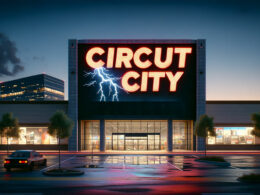Computing’s Lost Star: What Happened to Compaq?

So, let’s dive into the world of tech legends and talk about Compaq. Man, what a ride they had! This tale’s all about the brainy gang who thought, “Hey, let’s take on IBM,” and actually made it work. Wild, right?
Picture this: three amigos – Rod Canion, Jim Harris, and Bill Murto – chillin’ with some Tex-Mex and, boom, they dream up the Compaq Computer Corporation. They weren’t just dreaming about making any old computer; they were gunning for the big leagues, aiming to craft the very first IBM PC clone that actually got a thumbs up from the market.
The thing is, they didn’t just hit a homerun; they smashed it out of the park. The Compaq Portable – this chunky, luggable machine – was a game-changer.
Folks were digging it because it was like carrying your office around, minus the water cooler chats. This baby sparked some serious growth for Compaq, rocketing them into the big leagues faster than you can say “Silicon Valley.”
Here’s the juicy bit. IBM was the Goliath of the computer world, but David, a.k.a. Compaq, wasn’t just slinging stones; they were hurling smart, compatible tech that got people thinking, “Hey, maybe there’s more to life than Big Blue.”
The Compaq Portable was just the start. They rolled out the red carpet for the Deskpro – a sleek desktop that was giving IBM a run for its money. It wasn’t just a clone; it was like the cooler, younger sibling that comes along and steals all the attention at family gatherings.
Strategic Decisions and Missteps
The DEC Merger
Reasons behind the merger with Digital Equipment Corporation
So, why did Compaq, riding high on the hog, decide to buddy up with Digital Equipment Corporation (DEC)?
Well, DEC was like the wise old wizard of computing, and Compaq thought teaming up would cast a spell of unstoppable success. They figured it would beef up their tech arsenal and put them on a pedestal in the enterprise computing world.
Integration issues and cultural clashes
But, whoa, did things get messy. When you mush two big personalities together, it’s not always sunshine and rainbows.
They were like two different beats trying to groove to the same tune. Integration headaches? You bet. Cultural clashes? Like a sitcom without the laugh track.
Leadership Challenges
Changes in CEO and executive team
The captain of the ship changed more often than a chameleon in a disco.
CEOs were in and out like it was a game of musical chairs, and each one brought their own flavor to the mix. But, just like too many cooks spoil the broth, too many CEOs… well, you get the picture.
Scandals and forced resignations
Now, here’s where it gets spicy. Scandals popped up like popcorn, and the top brass was shuffled around like a deck of cards.
Resignations weren’t just handshakes and farewell cakes; they were more like, “Don’t let the door hit you on the way out.”
Compaq’s Downfall
Failure to Adapt
Inability to compete with direct-order companies like Dell
So, here’s the deal. Compaq was like the cool kid on the block until one day, it wasn’t. Enter stage left: Dell.
They started selling computers straight to the peeps, no middleman, no fuss. Compaq? They’re stuck in the ‘old school’ ways, trying to sell through stores. Like bringing a knife to a gunfight, man.
Mismanagement of the Y2K opportunity
Remember the Y2K scare? Everyone thought computers would freak out when the year 2000 hit. Compaq had this golden ticket to cash in, to upgrade all these scared systems.
But nah, they dropped the ball, big time. While others were surfing the Y2K wave, Compaq was paddling in the kiddie pool.
Market Changes
The dot-com bust and its impact on Compaq
The dot-com bust was like a party where suddenly the music stops and the lights come on.
Companies that were riding high on the internet wave crashed hard, and guess what, Compaq wasn’t wearing a life vest. The demand for PCs took a nosedive, and Compaq was left holding the bag.
Intel’s market moves and the commoditization of PC components
Intel was playing chess while everyone else played checkers. They kept cranking out chips faster than you can say “silicon,” and PCs became like toasters – you could get one anywhere, and they were all pretty much the same. Compaq’s PCs, once unique, were now just another face in the crowd.
The HP Merger and Aftermath
Acquisition by Hewlett-Packard
Stock price decline and HP’s takeover
Here comes the twist. HP, the big printer honcho, sees Compaq limping and thinks, “Hey, let’s team up.” They flash some cash, and before you know it, Compaq’s under the HP umbrella.
Only thing is, the stock market wasn’t throwing confetti; it was more like tomatoes. Stock prices did a nosedive, making you wonder, “What were they thinking?”
The merger’s disappointing results
So, the two tech titans shake hands, but instead of fireworks, it’s more like a wet sparkler. The promised land of synergies and mega-profits? Turns out, it was more of a mirage.
The merger’s like a jigsaw puzzle with half the pieces missing.
Legacy and Brand Phasing Out
The discontinuation of the Compaq brand
It’s kinda sad, really. Compaq, once a marquee name, started to fade. Picture an old movie star, once headlining, now doing infomercials.
Eventually, HP decided to pull the plug. Compaq’s name got shelved, a dusty relic of a bygone tech era.
Reflections on the HP-Compaq merger’s long-term effects
Let’s get real, the HP-Compaq shindig wasn’t all sunshine and rainbows. Folks expected a tech powerhouse, but instead, it was like a Frankenstein’s monster – bits and pieces trying to work together.
Looking back, what happened to Compaq is a lesson, a tech tale about the highs and lows, about trying to stay cool in a world that’s always looking for the next big thing.
Analysis and Speculation
What Could Have Been
Alternative scenarios: Compaq acquiring Gateway or remaining independent
Imagine a different universe for a sec. Compaq’s at a crossroads, right? There’s chatter about them snagging Gateway. Would’ve been wild, like a plot twist in a soap opera.
Gateway was all about that cow-spotted box vibe, and Compaq? More old-school. If they’d joined forces, maybe they could’ve cooked up something cool. Or, think about this – what if Compaq had just chilled and stayed solo? Flying solo could’ve given them the freedom to shake things up, keep it fresh.
Potential outcomes if HP had acquired DEC
Now, let’s flip the script. What if HP had swooped in and picked up Digital Equipment Corporation (DEC) instead of Compaq? DEC was a big deal back in the day, like the brainy kid in class.
HP and DEC could’ve been a dream team of innovation, maybe even changing the whole game. It’s like one of those “what if” moments that keep you up at night.
Compaq’s Legacy
The company’s role in the low-cost personal computer market
Compaq wasn’t just another tech company. They were the cool kids on the block, making PCs that didn’t cost an arm and a leg.
They were all about giving you that techy goodness without burning a hole in your wallet. It’s like they threw open the doors to the PC party and yelled, “Everyone’s invited!”
Lasting impacts on the PC industry
Even though Compaq’s not around anymore, they left some pretty big footprints in the tech sandbox. They shook things up, challenging the big dogs and showing that, hey, you don’t have to be a giant to make waves.
Their spirit of innovation, of shaking the tree and seeing what falls out, that’s something that’s still echoing in the industry today.
When people ask, “What happened to Compaq?” it’s not just about the rise and fall. It’s about the legacy they left behind, the ripples they made that are still rippling.
FAQ On What Happened To Compaq
Why Did Compaq Fail?
Oh man, Compaq’s story? It’s like a high-speed train that ran out of track. They were kings of the hill, but they kinda missed the memo on evolving markets. Direct sales models like Dell’s came outta nowhere, and Compaq was still playing catch-up.
The whole Y2K thing? A missed golden ticket for them. Plus, that dot-com bubble bursting didn’t do them any favors either. It’s a classic case of not pivoting fast enough in a world that waits for no one.
What Led to the HP and Compaq Merger?
This was like two tech titans thinking, “Hey, let’s join forces.” HP saw a chance to beef up their PC game and swooped in on Compaq, which was kinda limping after a few bad rounds in the market.
Both were eyeing a bigger slice of the tech pie. But like any epic team-up, the road was bumpy. Integration woes, culture clashes — you name it. It was more of a rocky marriage than a smooth merger.
What Happened to Compaq Computers?
They’re like relics of a bygone era now. Post-merger, HP kinda let the Compaq brand fade into the background. It went from headlining to a supporting act until it practically left the stage.
Compaq computers are still out there in the wild, but they’re more like collector’s items now, not the trailblazers they once were.
How Did Compaq Change the PC Industry?
Oh, Compaq shook things up big time! They were the cool new kid that wasn’t afraid to challenge the status quo. Their portable computers and server tech? Game changers. They forced everyone to up their game and made PCs accessible and, dare I say, fun. Their innovation DNA is still part of today’s tech fabric.
Was the HP and Compaq Merger Successful?
That’s a tough one. On paper, it looked like a tech powerhouse move. In reality, it was more of a soap opera. Disappointing results, integration headaches — it was no fairy tale. Some say it kinda diluted both brands. So, successful? Not really the word I’d use.
What Were Compaq’s Most Notable Achievements?
These guys were like the Beatles of the PC world for a while. They rolled out the first IBM-compatible PC that actually gave IBM a run for its money. Then there was the Compaq Portable — a game-changer in mobile computing.
And let’s not forget their server tech, which was like rocket fuel for the internet boom. They were hitting home runs left, right, and center.
Why Did Compaq’s Stock Price Decline?
Well, it was a cocktail of not-so-great things. Their inability to adapt fast enough in a market that was changing at warp speed was a biggie. The whole merger drama with HP didn’t help either.
It’s like their magic touch just faded, and investor confidence took a nosedive. When the big bucks lose faith, stock prices don’t usually throw a party.
Could Compaq Have Survived as an Independent Company?
That’s the million-dollar question, isn’t it? Some folks reckon they could’ve turned the ship around with some fresh ideas and a bit of elbow grease.
Others think the writing was on the wall, and it was only a matter of time before they’d have to wave the white flag. We can speculate all day, but the truth? We’ll never really know.
How Did the Dot-Com Bust Affect Compaq?
It was like someone hit the brakes hard on the tech express. Compaq, already wobbling from internal issues, got slammed by the bust. Their enterprise clients, who were riding the dot-com wave, suddenly tightened those purse strings. It was a domino effect that Compaq just couldn’t dodge.
What Could Compaq Have Done Differently?
Hindsight’s always 20/20, right? Maybe they could’ve doubled down on innovation, stayed nimble like the new kids on the block. Maybe they could’ve been quicker on the uptake with direct sales and e-commerce.
Maybe they could’ve swerved outta the way of that HP merger. A lot of maybes, but it’s all just armchair analysis now.
Conclusion On What Happened To Compaq
Alright, let’s rewind the tape back to the beginning. Compaq burst onto the scene like a rockstar, dropping that first IBM PC clone. Man, it was like catching lightning in a bottle.
They were on fire, cranking out machines that made everyone sit up and take notice. PCs were no longer just big, clunky boxes; Compaq made them cool, and everyone wanted a piece of that action. They climbed that industry ladder faster than a cat chased up a tree.
But hey, even rockstars have their off days. Compaq started tripping over their own shoelaces. They blinked, and just like that, the world changed. Direct-order companies like Dell started playing a whole new ballgame, and Compaq was left holding the bat.
Mix in some Y2K drama and the dot-com bust, and the stage was set for a tumble. People kept asking, “What happened to Compaq?” Well, they lost their groove, and in the tech world, that’s like forgetting the words to your own song.
So, here’s the deal. Tech’s like a high-speed train, and you gotta stay ahead of the tracks.
Compaq’s story is like a cautionary tale, a heads-up to always keep your eyes peeled. It’s all about making smart moves and playing chess, not checkers. You snooze, you lose, and that’s a lesson worth writing in bold.
But let’s not end on a downer. Compaq wasn’t just a flash in the pan. They left fingerprints all over the tech scene.
They showed us that innovation isn’t just about what you create; it’s about the doors you open for the next guy. Their legacy isn’t just in the machines they built; it’s in the spark they ignited, the fire they started in the world of personal computing. And that fire? It’s still burning bright today.
If you liked this article about what happened to Compaq, you should check out this article about what happened to THQ.
There are also similar articles discussing what happened to Sbarro, what happened to Nortel Networks, what happened to Sharper Image, and what happened to Polaroid.
And let’s not forget about articles on what happened to Tower Records, what happened to Netscape, what happened to Quibi, and what happened to Digg.
- Creating Stunning Visual Effects with Apps Like Adobe After Effects - May 1, 2024
- Managing Multiple Websites from a Single Installation - May 1, 2024
- C++ Capabilities: What is C++ Used For? - May 1, 2024








